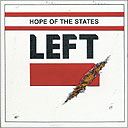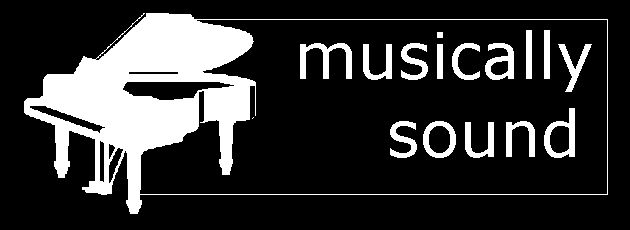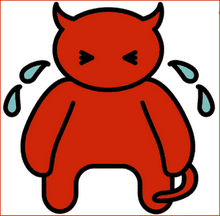 Hope of the States
Hope of the StatesLeft
[Post-rock]
Hope of the States are like no other band in recent memory. Adjectives used to describe the sound of their music are more along the lines of "hopeful" and "soaring" than "melodic". They aren't particular to any music scene, nor do they wish to be. They aren't even ashamed to call upon an orchestra when required - something practically forbidden in today's world of tight riffs and even tighter jeans. However, if one particular incident could be said to have distinguished them in 2004, the suicide of lead guitarist and founder member Jimi Lawrence would be pretty high on the list. Everyone from Newsnight to Rupert Murdoch seemed to want a piece of the news, and unfortunately for Sam Herlihy's boys, the unforgettable sound of their debut album became lost in typically melodramatic media frenzy.
Receiving mixed reviews (including one of the most amateurish ever published on Pitchfork Media, from a writer who hadn't contributed before, and thankfully hasn't been heard of since), The Lost Riots was heard by few and appreciated by even less. Yet for the band's supporters, it was one of 2004's strongest releases, superbly balancing Herlihy's fractured vocals with suitably grandiose post-rock arrangements. Two years later and Hope of the States' sophomore effort, Left, has arrived, hoping to further capture the band's unique sound and act as an ideal antidote to the ephemeral trite pushed by the likes of NME. The Automatic? Too right.
What's immediately obvious on first listen to Left is that Hope of the States have become a much more rigid musical outfit. Instrumental opener "Seconds" gets the album rolling with twitchy strings and stacatto beats, before flattening out into a smoother sound as the listener prepares for a severe aural workout. However, coming in at under two minutes, “Seconds” has no chance to reach the blistering highs and dramatic lows of The Lost Riots' opener, "The Black Amnesias", to which it will be inevitably compared. It comes off as something of a disappointment, and with mediocre lead single "Blood Meridian" following immediately after, one begins to fear that Hope of the States have lost all sense of what made their debut effort so wonderful. "Emergency, emergency / Someone acted honestly" notes Herlihy in his signature faux-Americana whine, however with such a standard rise/fall string backing and a guitar lead Editors would think twice about adopting, this particular call-to-arms comes off as tired and routine.
Fortunately, second single "Sing It Out" plays perfectly to the band's strengths while also showcasing the benefits of a tighter sound. A pulsing drum beat overlaps smoothly with post-punk guitar, giving the song some real bite and setting the stage perfectly for one of the band's trademark first-pumping choruses ("Sing it out / Sing it out / You are not alone"). The line "I am debt / I am loss / I am written off again and again and again and again" then gives a brief glimpse into the socialist agenda hinted at in the record's title, and is a nice alternative to conventional mainstream love/loss themes.
While "Seconds" barely had time to get going, fourth song "Bonfires" is a prime example of a shortcoming apparent in many of Left's weaker songs - it is a three minute song trapped in a much larger space, and the record's momentum suffers because of it. When Herlihy spits "I'll lead them off the edge, I'll drown them in the Dead Sea / Now they're noticing", the urgency of the line is lost through endless repeats of the chorus and a worthless, minute-long outro. By the time "The Good Fight" gently phases in, much of the impact is forgotten. On The Lost Riots, the orchestral mist enveloping many of the songs was entirely welcome and served an emotional purpose. When strings are replaced by cold riffage, however, the point is lost.
Thank goodness "The Good Fight" is such a tear jerker, then, and allows the album to regain its focus with delicate ease. "Defiant I shall be today / But I won't forget how much we paid" may mean nothing to you, it may mean everything; whatever the case, it expresses more than any other moment on Left the ideology of the band. If this line resonates with you, and it certainly did with this reviewer, then you will appreciate what is to be said. On the other hand, if lyrics to you are nothing more than "Gorilla, cuntilla", you should perhaps look elsewhere. Towards the end of the song, the hazy guitar and plodding drums give way to a single acoustic guitar. "We'll win in another life / I know we will" sings a choir , "Tomorrow is another chance / To make the next day better". Embrace comparisons are welcome, if only to exhibit complete, unadulterated musical ignorance. There has never been a better line to raise a lighter to, cheesy or otherwise.
Album centre piece "Left" sounds like the thirteenth best song recorded in sessions for The Lost Riots. It's long, has strings and piano, yet somehow lacks pathos. The chorus is far too overblown, the lyrical focus has wavered somewhat (What you want, yr never gonna get / Unless you are prepared to be alone) and the instrumental parts are dull. Someone in Hope of the States' A&R department has decided it would be a good single, whereas the emphatic, violent, loud, short and very, very sweet "Industry" would do a far better job. Here Herlihy is on his best ever lyrical form ("The factory cheats and the industry lies / Your daddy ain't got a job in the morning") and is backed by a punchy drum beat, winding guitars and nicely textured synth effects. Only "The Red The White The Black The Blue" stands above this is the band's repertoire.
Not far behind the dizzying kick of "Industry" is another example of Hope of the States’ typically resigned take on politics, "This Is A Question", opting for long gazes into the night sky rather than picket lines and wire fences. Arguably the best song musically on Left, genuinely moving crescendos roll over one of Herlihy’s strongest ever vocal performances. Proving he deserves his much-debated tag as one of the best rock vocalists around, the emotional brutality of his delivery here is a far cry from the exhausted tone of The Lost Riots. While the message here is not the strongest on Left by any means ("If you sing a couple of words the world moves / It changes because you do / It changes 'cause we need it to"), the way it is belted out thankfully recalls "Death or Glory" rather than "Killing in the Name".
"Little Silver Birds" is something of an obscure, confused rant about industrial dehumanisation ("All the people stuck behind dead bolts"), love ("Let nobody tell you that yr heart was wrong") and opportunism ("I am in love with the chance that we could all do better than we do"). While lyrically powerful, the structure is decidedly by-numbers and, apart from a fantastic final minute, is largely forgettable. The disappointment continues with "Four", a routine chest beater with ham-fisted lyrics ("You people should wonder / How yr ever gonna shut us up forever") and "Forwardirection:", an initially light acoustic number with a repetitive, overly harsh chorus that would better have been left as a b-side.
Superb piano ballad "January" then adds to Left's triumphs, recalling "Don't Go To Pieces", one of The Lost Riots' strongest pieces. Here, sonar bleeps and whirls are used to good effect as Herlihy laments the loss of Jimi Lawrence ("I fell apart in January / But I fixed myself for everybody"). Along with memorable closer "The Church Choir", "January" never sounds as though it is attempting to imitate the swirling crescendos of its predecessor (as opposed to earlier songs "Left" and "Little Silver Birds"), but instead use those foundations on which to build something better.
Overall, Left finds Hope of the States in something of a middle ground. Some songs suggest a punkier progression ("Sing It Out", "Blood Meridian", "Industry"), whereas others stick to the post-rock formula that was previously used to such good effect ("Left", "The Church Choir"). Both sounds have their moments on the album, but it is where each theme is pushed to excess that the most success is achieved. For example, "Industry" and "The Church Choir" stand out immediately, whereas "Blood Meridian" and "Four" are muddled and hence tend to get lost in the mix. We know Hope of the States can never make another The Lost Riots, the worry with Left is that they may never make anything as good. Granted, it is a difficult task, but for a band with such grit and ambition it is certainly within reach. To sum up in Herlihy's own words - an underachiever but a true believer. 71



1 comment:
5 months later and it is still sat in my CD player. bloody brilliant.
Post a Comment